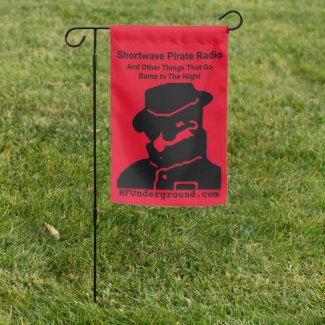The format FCC enforcement database does not make it easy to determine that but my potentially incomplete search revealed the following in 2015, from operation on 6876 KHz in Michigan:
https://docs.fcc.gov/public/attachments/DOC-336269A1.pdf
which would be associated with this thread about The Crystal Ship, which was the "reboot" of a very well-known HF pirate in the 1980s, though there is no mention of "the knock" here, for what that is worth:
https://www.hfunderground.com/board/index.php/topic,23152.msg84410.html#msg84410
Going backward in time from there, the next thing I found was the YHWH incident at the end of 2014, already discussed in this thread. Before that, I found this from 2013:
https://docs.fcc.gov/public/attachments/DOC-320165A1.pdf
I was unable to find an HFU thread associated with this incident.
Later that year, I found this though it is unclear to me if this was associated with what we would consider to be a pirate broadcast, or something else like run-of-the-mill RF interference, which is documented quite often in the enforcement database:
https://docs.fcc.gov/public/attachments/DOC-324212A1.pdf
https://docs.fcc.gov/public/attachments/DOC-324211A1.pdf
I do remember, back in 2016 or 2017, John Poet talking about getting the knock somewhere on the board. But I also remember that there was some heated argument where real names were revealed which I know got deleted forever by the mods or admin, and perhaps that particular post was among those that were removed. The gist was that some other pirate ratted out TCS, which led to JP finding other folks to relay his shows while he was still making them. He seems to be permanently retired now.
You are remembering the controversy over the 2011 bust, which continued for years...
I never made any public comment about anything which may or may not have happened after that, other than this:
http://www.tcsshortwave.com/2015/12/yes-virginia-there-is-still-tcs.htmlYeah, there was some tussel with JTA years later, after I had made some negative comment about "the rabbit",
and JTA posted my real name on this board (which everyone who cared already knew anyway),
stated that "any pirate who has been busted deserves to have their real name publicized"
or something to that effect, (talk about "fighting for free radio"??)
after which I reminded him that his home address was a matter of public record
because he held an FCC amateur license--
at which point the conversation was terminated, and removed by our kind host here. LOL
Ah, memories
"Memories
Like the corners of my mind
Misty watercolor memories
Of the way we were"
Nothing but death is 'permanent', and I am still alive....
I have just been 'busy elsewhere', not permanently retired...
I guess this leaves my station or associated operations as the last "bust" (sort of) of a shortwave pirate!
I will claim that mantle with pride, as I am incorrigible
However, please note that there were numerous TCS relay broadcasts in the months after that rumored second bust:
http://www.tcsshortwave.com/2015/12/yes-virginia-there-is-still-tcs.html



